Gairdner J. History of the Life and Reign of Richard the Third: To which is Added the Story of Perkin Warbeck from Original Documents
Подождите немного. Документ загружается.


3
8o
INDEX.
Percy, lord (Northumberland?), 356,
358
Persall, Sir Hugh, 362
Perth, 301
Philip the Good, duke of Burgundy,
7 .
Philip, son of Archduke Maximilian,
173;
afterwards Archduke of
Austria, encourages Perkin War-
beck, 275, 277, 279, 290
Philip, David, 342
Picardy, governor of, 292-3
Picquigny, interview at, 27
Plantagenet, Richard (a son of
Richard III?), 249
Plymouth, 149
Pointz, Sir Rob., 365
Pole,
Anne de la, daughter of
the duke of Suffolk, betrothed
to James, duke of Rothesay,
180
Pomfret (or Pontefract), residence
of Richard at, as steward of the
duchy of Lancaster, 24, 113, 148;
Rivers and others beheaded at,
52,
67, 94; visited by Richard as
king, 183, 189, 190
Pomfret priory, 145
Poole, Dorsetshire, 142, 186-7
Porchester castle, 128
Portsoken ward, London, 187
Portugal, Warbeck in, 279; king
of. See Emmanuel
Post system, commencement of the,
185
Potter, Richard, 343
Pottyer, of Redcross Street, his
anticipation that Richard would
be king, 45
Powis, lord. See Grey, John
Poynings (Ponynges), Edward, 169,
343;
afterwards Sir Edward, 277,
363;
his government of Ireland,
293
Puebla, Rodrigo de, Spanish am-
bassador, 313, 315, 333
Puissant, Piers, secretary to the
Archduke Maximilian, 174
Pympe, John, 343
Queenborough castle, 251
Radclif,
Robert, 338-9. See also
Ratcliffe
Ramsay, Sir James, his Lancaster
and
York,
188 note
Ramsay, John. See Bothwell,
lord
Ratcliffe, Sir Richard, councillor of
Richard III., 49, 61, 94, 119, 123,
189;
opposes Richard's marrying
his niece, 205, 206; with Richard
III.
at Bosworth, 234; where he
is killed, 242
Ratcliffe, Robert, adherent of War-
beck, 287. See also Radclif
Ravenspur, in Yorkshire (now sub-
merged), the place of Edward's
landing, 9
Raynford, Sir Laurence, 339
Reading, in
Rede, Morgan, 342
Reformation, the, its effect on church
and state, 163
Renues, in Britanny, 152, 165
Richard II., 33 note, 107—8
Richard III., disputed character of,
1,
2; his birth, 3, 4; his brothers
and sisters, 4, 5; his supposed
early ill health, 5; taken at Lud-
low castle, 6; sent to Utrecht, 7;
returns and is created duke of
Gloucester, 8; adheres to his
brother Edward as king, 9; tam-
pered with by Warwick, 9 note;
is rewarded with offices, id.; re-
turns with him from exile, ib.\
his conduct at York, 10; fights
for Edward at Barnet and Tewkes-
bury, 11; believed to have mur-
dered Prince Edward, 11-15;
Constable of England at the trial
of the Tewkesbury prisoners, 15 ;
his complicity in the murder of
Henry VI., 16-19; further re-
warded, 19; his marriage to Anne
Nevill, 19; his dispute with
Clarence, 20-24; dissatisfied with
Edward IV.'s peace with France,
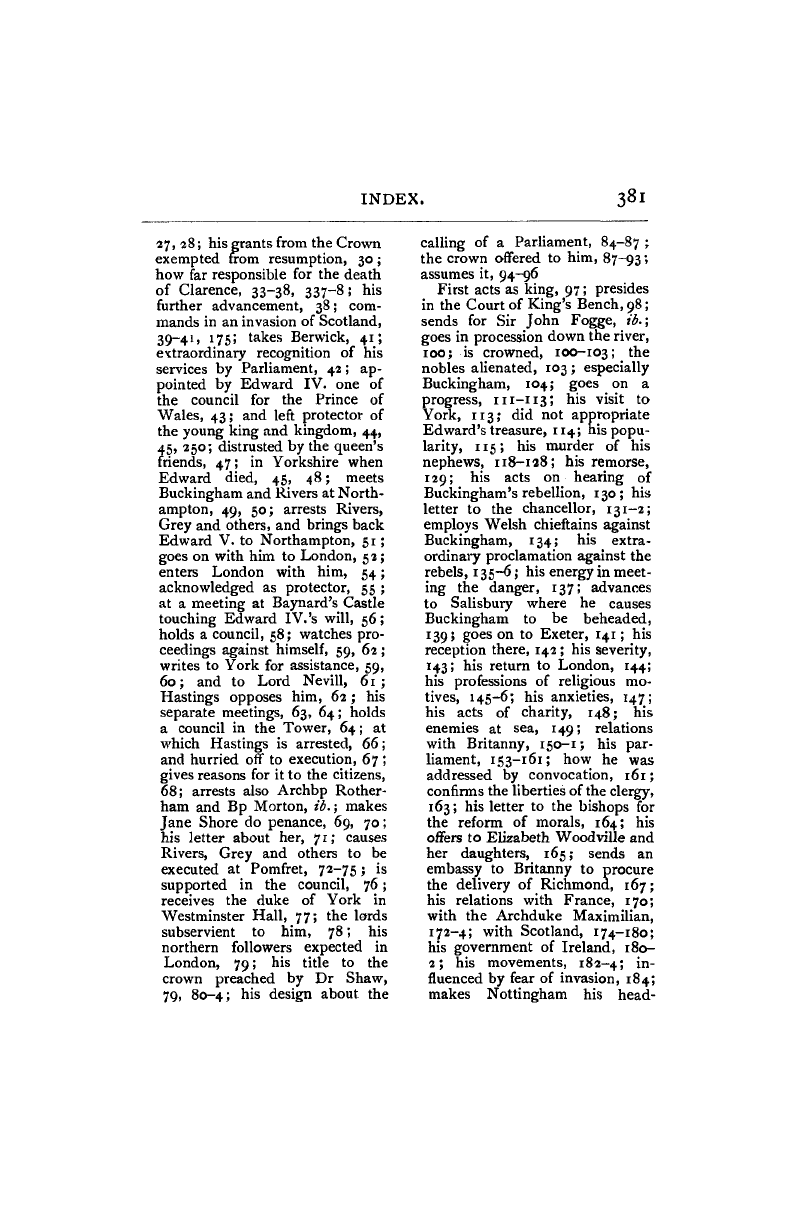
INDEX.
381
27,28;
his grants from the Crown
exempted from resumption, 30;
how far responsible for the death
of Clarence, 33-38, 337-8; his
further advancement, 38; com-
mands in an invasion of Scotland,
39-41,
175; takes Berwick, 41;
extraordinary recognition of his
services by Parliament, 42; ap-
pointed by Edward IV. one of
the council for the Prince of
Wales, 43; and left protector of
the young king and kingdom, 44,
45,
250; distrusted by the queen's
friends, 47; in Yorkshire when
Edward died, 45, 48; meets
Buckingham and Rivers at North-
ampton, 49, 50; arrests Rivers,
Grey and others, and brings back
Edward V. to Northampton, 51;
goes on with him to London, 52;
enters London with him, 54;
acknowledged as protector, 55 ;
at a meeting at Baynard's Castle
touching Edward IV.'s will, 56;
holds a council, 58; watches pro-
ceedings against
himself,
59, 62;
writes to York for assistance, 59,
60;
and to Lord Nevill, 61;
Hastings opposes him, 62 ; his
separate meetings, 63, 64; holds
a council in the Tower, 64; at
which Hastings is arrested, 66;
and hurried off to execution, 67 ;
gives reasons for it to the citizens,
68;
arrests also Archbp Rother-
ham and Bp Morton, id.; makes
Jane Shore do penance, 69, 70;
his letter about her, 71; causes
Rivers, Grey and others to be
executed at Pomfret, 72-75; is
supported in the council, 76;
receives the duke of York in
Westminster Hall, 77; the lords
subservient to him, 78; his
northern followers expected in
London, 79; his title to the
crown preached by Dr Shaw,
79,
80-4; his design about the
calling of a Parliament, 84-87 ;
the crown offered to him, 87-93
-
>
assumes it, 94-96
First acts as king, 97; presides
in the Court of King's Bench, 98;
sends for Sir John Fogge, ib.;
goes in procession down the river,
100;
is crowned, 100-103; the
nobles alienated, 103; especially
Buckingham, 104; goes on a
progress, 111-113; his visit to
York, 113; did not appropriate
Edward's treasure, 114; his popu-
larity, 115; his murder of his
nephews, 118-128; his remorse,
129;
his acts on hearing of
Buckingham's rebellion, 130; his
letter to the chancellor, 131-2;
employs Welsh chieftains against
Buckingham, 134; his extra-
ordinary proclamation against the
rebels, 135-6; his energy in meet-
ing the danger, 137; advances
to Salisbury where he causes
Buckingham to be beheaded,
139;
goes on to Exeter, 141; his
reception there, 142; his severity,
143;
his return to London, 144;
his professions of religious mo-
tives,
145-6; his anxieties, 147;
his acts of charity, 148; his
enemies at sea, 149; relations
with Britanny,
150-1;
his par-
liament,
153-161;
how he was
addressed by convocation, 161;
confirms the liberties of the clergy,
163;
his letter to the bishops for
the reform of morals, 164; his
offers to Elizabeth Woodville and
her daughters, 165; sends an
embassy to Britanny to procure
the delivery of Richmond, 167;
his relations with France, 170;
with the Archduke Maximilian,
172-4;
with Scotland, 174-180;
his government of Ireland, 180-
2;
his movements, 182-4; in-
fluenced by fear of invasion, 184;
makes Nottingham his head-
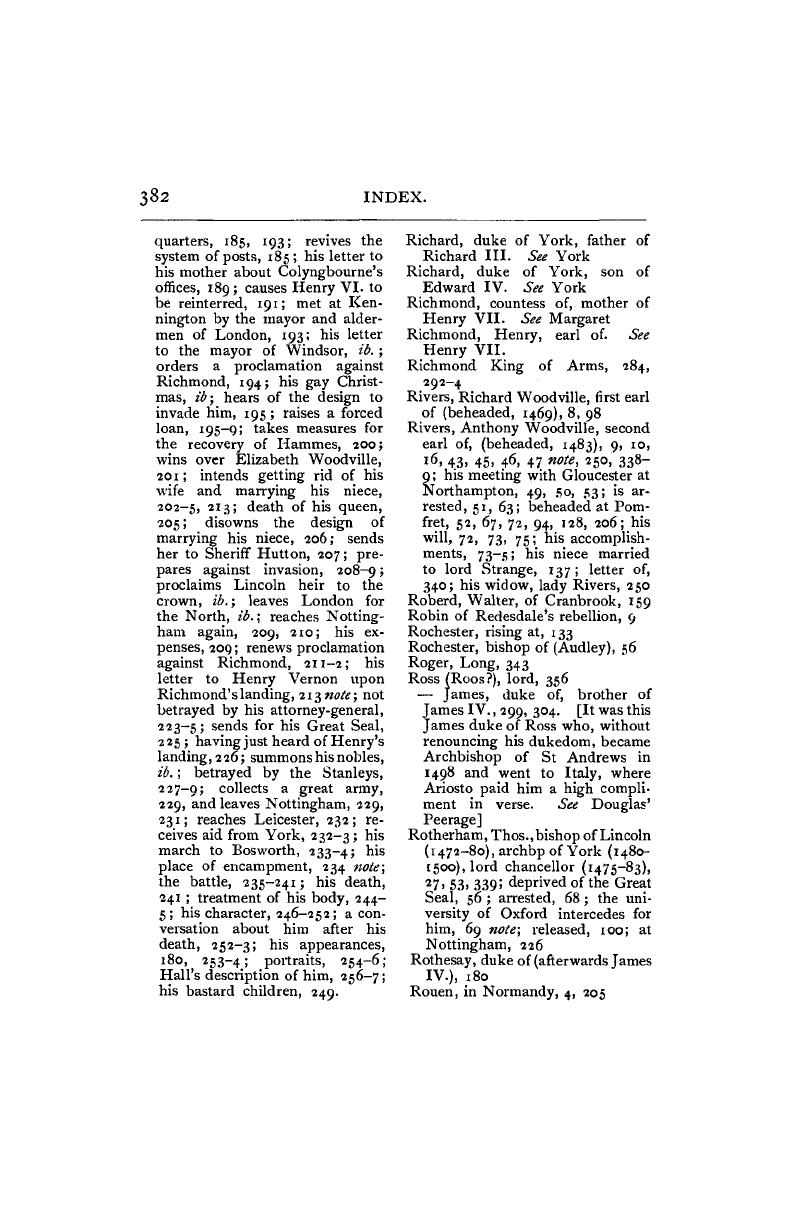
382
INDEX.
quarters, 185, 193; revives the
system of posts, 185; his letter to
his mother about Colyngbourne's
offices, 189; causes Henry VI. to
be reinterred, 191; met at Ken-
nington by the mayor and alder-
men of London, 193; his letter
to the mayor of Windsor, ib.;
orders a proclamation against
Richmond, 194; his gay Christ-
mas,
ib; hears of the design to
invade him, 195; raises a forced
loan, 195-9; takes measures for
the recovery of Hammes, 200;
wins over Elizabeth Woodville,
•201;
intends getting rid of his
wife and marrying his niece,
202-5,
213; death of his queen,
205;
disowns the design of
marrying his niece, 206; sends
her to Sheriff Hutton, 207; pre-
pares against invasion, 208-9;
proclaims Lincoln heir to the
crown, ib.; leaves London for
the North, ib.; reaches Notting-
ham again, 209, 210; his ex-
penses, 209; renews proclamation
against Richmond, 211-2; his
letter to Henry Vernon upon
Richmond's landing, 213 note; not
betrayed by his attorney-general,
223-5;
sends for his Great Seal,
225 ; having just heard of Henry's
landing, 226; summons his nobles,
ib.;
betrayed by the Stanleys,
227-9;
collects a great army,
229,
and leaves Nottingham, 229,
231;
reaches Leicester, 232; re-
ceives aid from York,
232-3;
his
march to Bosworth, 233-4; h'
s
place of encampment, 234 note;
the battle,
235-241;
his death,
241;
treatment of his body, 244-
5;
his character, 246-252; a con-
versation about him after his
death,
252-3;
his appearances,
180,
253-4; portraits, 254-6;
Hall's description of him, 256-7;
his bastard children, 249.
Richard, duke of York, father of
Richard III. See York
Richard, duke of York, son of
Edward IV. See York
Richmond, countess of, mother of
Henry VII. See Margaret
Richmond, Henry, earl of. See
Henry VII.
Richmond King of Arms, 284,
292-4
Rivers, Richard Woodville, first earl
of (beheaded, 1469), 8, 98
Rivers, Anthony Woodville, second
earl of, (beheaded, 1483), 9, 10,
16.
43. 45. 46, 47
n
»te, 250, 338-
9; his meeting with Gloucester at
Northampton, 49, 50, 53; is ar-
rested, 51, 63; beheaded at Pom-
fret, 52, 67, 72, 94, 128, 206; his
will, 72, 73, 75; his accomplish-
ments, 73-5; his niece married
to lord Strange, 137; letter of,
340;
his widow, lady Rivers, 250
Roberd, Walter, of Cranbrook, 159
Robin of Redesdale's rebellion, 9
Rochester, rising at, 133
Rochester, bishop of (Audley), 56
Roger, Long, 343
Ross (Roos?), lord, 356
— James, duke of, brother of
James IV., 2
99,
304. [It was this
James duke of Ross who, without
renouncing his dukedom, became
Archbishop of St Andrews in
1498 and went to Italy, where
Ariosto paid him a high compli-
ment in verse. See Douglas'
Peerage]
Rotherham,
Thos.,
bishop of Lincoln
(1472-80), archbp of York (1480-
[500),
lord chancellor (1475-83),
2
7> 53, 339; deprived of the Great
Seal, 56 ; arrested, 68; the uni-
versity of Oxford intercedes for
him, 69 note; released, 100; at
Nottingham, 226
Rothesay, duke of (afterwards James
IV.),
180
Rouen, in Normandy, 4, 205

INDEX.
383
Rous,
the Warwickshire hermit, 254
Roussillon herald, 171-2
Rucq, Guillaume, 330
Russell, Dr John, bishop of Lincoln,
made lord chancellor, 56, 58, 71,
72,
77; his speeches for the open-
ing of Parliament, under Edward
V., 64, 85 ; receives the Great
Seal from Richard, 97 ; ordered
to send it to him, 130-2; his
sermons for the opening of Par-
liament under Richard, 153-5;
in convocation, 162
Rutland, Edmund, earl of, third son
of Richard, duke of York, 4, 5, 7
Ryseley, Sir John, 364
St Albans, second battle of (1461), 7
St Andrews, in Scotland, 304, 310
— archbishop of (William
Schives), 175, 177
St John, prior of the knights of, 15;
hospital of, at Clerkenwell, 57
St Leger, Sir Thomas, 27, [33,
143.
158
St Martin's Ie Grand, sanctuary of,
21,
199
St Michael's Mount, the earl of
Oxford's attempt at, 19; Perkin
Warbeck's wife there, 329
St Paul's, London, 17, 54; meeting
of parties at, 62, 63; Richard's
procession to, 94; rhyme posted
on the cathedral door, 188
Salisbury, rising at, 133; Bucking-
ham beheaded there, 139
Salisbury, bishop of. See Woodville,
Lionel
Salisbury, earl of (Richard Nevill,
father of Warwick the king-
maker), 22
Salisbury, earldom of, 22 note; con-
ferred on Richard's son Edward,
3.6
Salisbury, William, 178
Sandal castle, 251
Sandwich, Edward IV.'s will made
at, 44
Sanford, Sir Brian, 231
Savage, Sir John, 215-6, 231, 348,
35O-2.
354-5, 357-8, 362
Saxony, Albert, duke of, supports
Warbeck, 279, 280
Scales, Anthony Woodville, lord
(ob.
1483), 10
Scarborough, Richard III. at, 183-4
Scarsdale, Derbyshire, 105
Scotland, affairs in, 174-180; peace
with, 180; bad relations with
England, 298-300; Warbeck in,
6
3> 33
Scrope, John, lord, of Bolton, 142,
'49.
356
Serjeant, William, 342
Seven sheriffdoms, the, 309
Severn river, 134, 138
Shakespeare's Richard III., 1, 33,
35,
45, 249; his Henry
VIII.,
83
note
Shaunde, Philibert de (created earl
of Bath, i486), 213, 246, 363
Shaw, Sir Edmund, lord mayor, 79
— Dr Ralph, his sermon at
Paul's Cross,
79-81,
83, 89
Sheen, Warbeck's escape to, 332
Sheriff Hutton, 73, 94; castle of,
183,
207
Sherwood, John, bishop of Dur-
ham (1485), 356
Shore, Jane, 69-72, 135; her hus-
band, William Shore, 71
Shrewsbury, earl of Richmond at,
216, 221
Shrewsbury, earl of, 360, 362
Simnel, Lambert, 243, 275, 298
Siver, William,
bp
of Carlisle (1495-
[502),
302
Skelton, Edward, councillor of
Warbeck, 328
note
Somerset, Edmund Beaufort, fourth
duke of, (beheaded 1471), ir, 15
Somerset, John Beaufort, first duke
of, eldest son of John of Gaunt,
legitimated, 107,
108 note
Sosa, Ruy de, a Portuguese knight,
313
Southampton, comptroller of cus-
toms at, 128
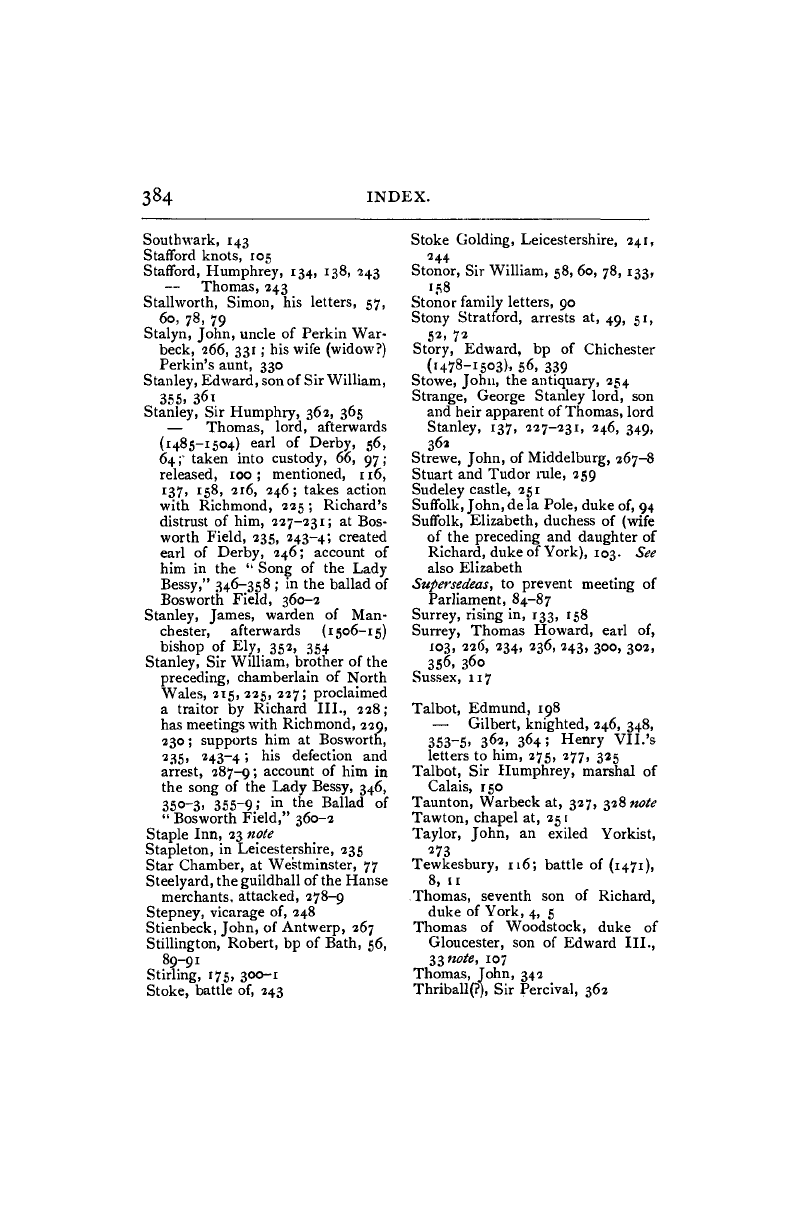
INDEX.
Southwark, 143
Stafford knots, 105
Stafford, Humphrey, 134, 138, 243
Thomas, 243
Stallworth, Simon, his letters, 57,
60,
78, 79
Stalyn, John, uncle of Perkin War-
beck, 266, 331; his wife (widow?)
Perkin's aunt, 330
Stanley, Edward, son of Sir William,
355.
361
Stanley, Sir Humphry, 362, 365
— Thomas, lord, afterwards
(1485-1504) earl of Derby, 56,
64;"
taken into custody, 66, 97;
released, 100; mentioned, 116,
I
37*
r
58>
2
'6> 246; takes action
with Richmond, 225; Richard's
distrust of him,
227-231;
at Bos-
worth Field, 235, 243-4; created
earl of Derby, 246; account of
him in the " Song of the Lady
Bessy," 346-358 ; in the ballad of
Bosworth Field, 360-2
Stanley, James, warden of Man-
chester, afterwards (1506-15)
bishop of Ely, 352, 354
Stanley, Sir William, brother of the
preceding, chamberlain of North
Wales, 215, 225, 227; proclaimed
a traitor by Richard III., 228;
has meetings with Richmond, 229,
230;
supports him at Bosworth,
235,
243-4; his defection and
arrest, 287-9! account of him in
the song of the Lady Bessy, 346,
35o-3> 355-9;
in the
Ballad of
" Bosworth Field," 360-2
Staple Inn, 23 note
Stapleton, in Leicestershire, 235
Star Chamber, at Westminster, 77
Steelyard, the guildhall of the Hanse
merchants, attacked, 278-9
Stepney, vicarage of, 248
Stienbeck, John, of Antwerp, 267
Stillington, Robert, bp of Bath, 56,
89-91
Stirling, 175, 300-1
Stoke, battle of, 243
Stoke Golding, Leicestershire, 241,
244
Stonor, Sir William, 58, 60, 78, 133,
158
Stonor family letters, 90
Stony Stratford, arrests at, 49, 51,
52.
72
Story, Edward, bp of Chichester
(1478-1503), 56, 339
Stowe, John, the antiquary, 254
Strange, George Stanley lord, son
and heir apparent of Thomas, lord
Stanley, 137,
227-231,
246, 349,
362
Strewe, John, of Middelburg, 267-8
Stuart and Tudor rule, 259
Sudeley castle, 251
Suffolk, John, de la Pole, duke of, 94
Suffolk, Elizabeth, duchess of (wife
of the preceding and daughter of
Richard, duke of York), 103. See
also Elizabeth
Superseded.*,
to prevent meeting of
Parliament, 84-87
Surrey, rising in, 133, 158
Surrey, Thomas Howard, earl of,
103,
226, 234, 236,
243,
300, 302,
356,
360
Sussex, 117
Talbot, Edmund, 198
—• Gilbert, knighted, 246, 348,
353-5.
3
62
.- 364; Henry VII.'s
letters to him, 275, 277, 325
Talbot, Sir Humphrey, marshal of
Calais, 150
Taunton, Warbeck at, 327, 328 note
Tawton, chapel at, 251
Taylor, John, an exiled Yorkist,
273
Tewkesbury, 116; battle of (1471),
8, 11
Thomas, seventh son of Richard,
duke of York, 4, 5
Thomas of Woodstock, duke of
Gloucester, son of Edward III.,
i$no(e, 107
Thomas, John, 342
Thriball(?), Sir Percival, 362
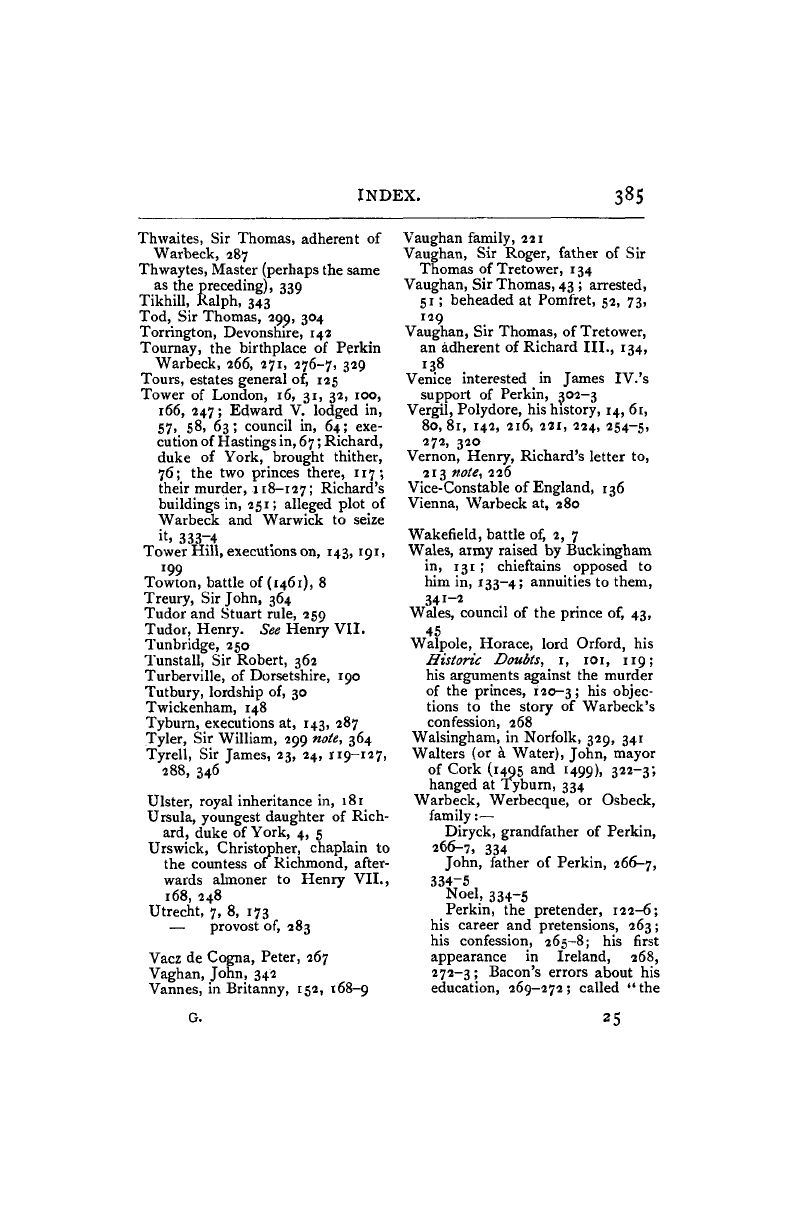
INDEX.
385
Thwaites, Sir Thomas, adherent of
Warbeck, 287
Thwaytes, Master (perhaps the same
as the preceding), 339
Tikhill, Ralph, 343
Tod, Sir Thomas, 299, 304
Torrington, Devonshire, 142
Tournay, the birthplace of Perkin
Warbeck, 266, 271, 276-7, 329
Tours,
estates general of, 125
Tower of London, 16, 31, 32, 100,
166,
247; Edward V. lodged in,
57,
58, 63; council in, 64; exe-
cution of Hastings in, 67; Richard,
duke of York, brought thither,
76;
the two princes there, 117;
their murder, 118-127; Richard's
buildings in, 251; alleged plot of
Warbeck and Warwick to seize
it. 333-4
Tower Hill, executions on,
143,191,
199
Towton, battle of (1461), 8
Treury, Sir John, 364
Tudor and Stuart rule, 259
Tudor, Henry. See Henry VII.
Tunbridge, 250
Tunstall, Sir Robert, 362
Turberville, of Dorsetshire, 190
Tutbury, lordship of, 30
Twickenham, 148
Tyburn, executions at, 143, 287
Tyler, Sir William, 299 note, 364
Tyrell, Sir James, 23, 24, 119-127,
288,
346
Ulster, royal inheritance in, 181
Ursula, youngest daughter of Rich-
ard, duke of York, 4, 5
Urswick, Christopher, chaplain to
the countess of Richmond, after-
wards almoner to Henry VII.,
168,
248
Utrecht, 7, 8, 173
— provost of, 283
Vacz de Cogna, Peter, 267
Vaghan, John, 342
Vannes, in Britanny, 152, 168-9
Vaughan family, 221
Vaughan, Sir Roger, father of Sir
Thomas of Tretower, 134
Vaughan, Sir Thomas, 43 ; arrested,
51;
beheaded at Pomfret, 52, 73,
129
Vaughan, Sir Thomas, of Tretower,
an adherent of Richard III., 134,
138
Venice interested in James IV.'s
support of Perkin, 302-3
Vergil, Polydore, his history, 14, 61,
80,
81, 142, 216, 221, 224, 254-5,
272,
320
Vernon, Henry, Richard's letter to,
213 note, 226
Vice-Constable of England, 136
Vienna, Warbeck at, 280
Wakefield, battle of, 2, 7
Wales, army raised by Buckingham
in, 131 ; chieftains opposed to
him in, 133—4; annuities to them,
341-2
Wales, council of the prince of, 43,
45
Walpole, Horace, lord Orford, his
Historic Doubts, 1, 101, 119;
his arguments against the murder
of the princes,
120-3!
n
'
s
objec-
tions to the story of Warbeck's
confession, 268
Walsingham, in Norfolk, 329, 341
Walters (or a Water), John, mayor
of Cork (1495 and 1499), 3"-3!
hanged at Tyburn, 334
Warbeck, Werbecque, or Osbeck,
family:—
Diryck, grandfather of Perkin,
266-7,
334
John, father of Perkin, 266-7,
334-5
Noel, 334-5
Perkin, the pretender, 122-6;
his career and pretensions, 263;
his confession, 265-8; his first
appearance in Ireland, 268,
272—3;
Bacon's errors about his
education, 269-272; called "the
G.
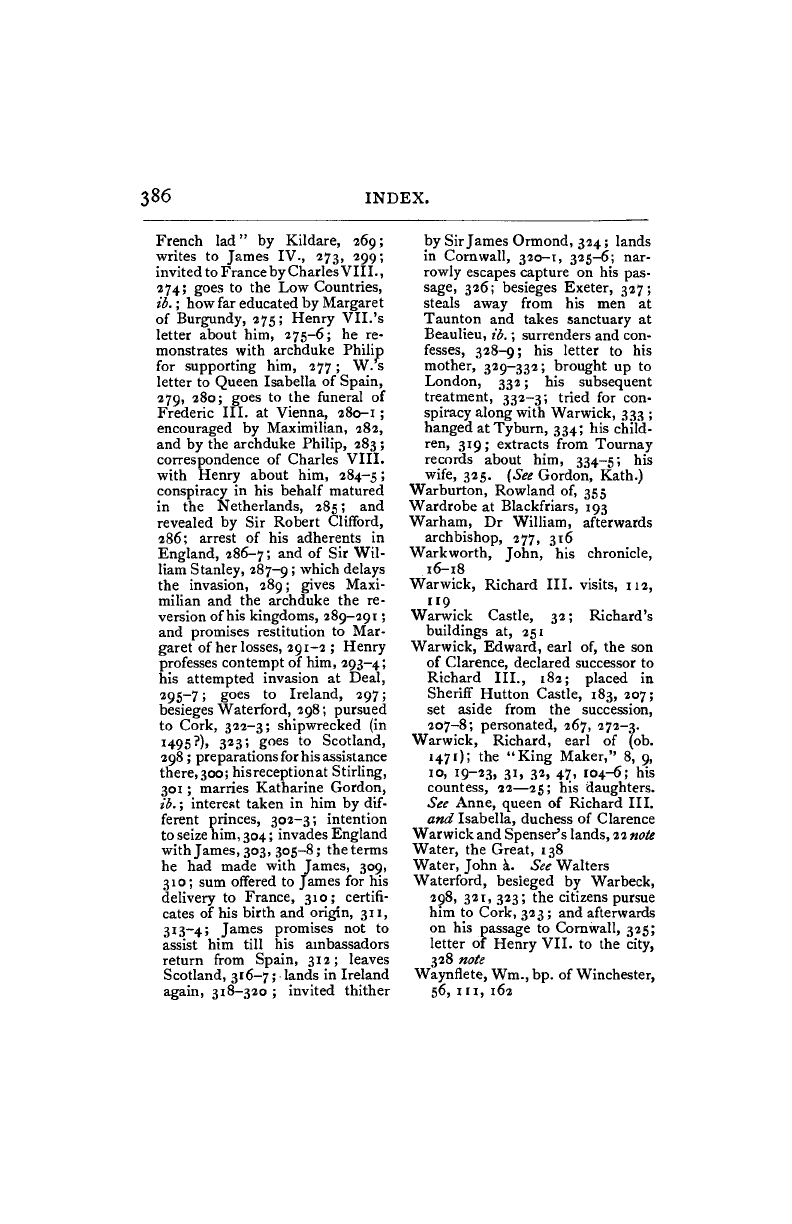
386
INDEX.
French lad" by Kildare, 269;
writes to James IV., 273, 299;
invited to France by Charles VIII.,
274;
goes to the Low Countries,
ib.;
how far educated by Margaret
of Burgundy, 275; Henry VII.'s
letter about him, 275-6; he re-
monstrates with archduke Philip
for supporting him, 277; W.'s
letter to Queen Isabella of Spain,
279,
280; goes to the funeral of
Frederic III. at Vienna,
280-1;
encouraged by Maximilian, 282,
and by the archduke Philip, 283;
correspondence of Charles VIII.
with Henry about him, 284-5
>
conspiracy in his behalf matured
in the Netherlands, 285; and
revealed by Sir Robert Clifford,
286;
arrest of his adherents in
England, 286-7; and of Sir Wil-
liam Stanley, 287-9
>
which delays
the invasion, 289; gives Maxi-
milian and the archduke the re-
version of
his
kingdoms,
289-291;
and promises restitution to Mar-
garet of her losses, 291-2 ; Henry
professes contempt of him, 293-4;
his attempted invasion at Deal,
295-7;
goes to Ireland, 297;
besieges Waterford, 298; pursued
to Cork,
322-3;
shipwrecked (in
1495?), 323; goes to Scotland,
298;
preparations for his assistance
there,
300;
his reception at Stirling,
301;
marries Katharine Gordon,
ib.;
interest taken in him by dif-
ferent princes,
302-3;
intention
to seize him,
304;
invades England
with James, 303, 305-8; the terms
he had made with James, 309,
310;
sum offered to James for his
delivery to France, 310; certifi-
cates of his birth and origin, 311,
313-4;
James promises not to
assist him till his ambassadors
return from Spain, 312; leaves
Scotland, 316-7; lands in Ireland
again, 318-320; invited thither
by Sir James Ormond, 324; lands
in Cornwall, 320-I1 325-6; nar-
rowly escapes capture on his pas-
sage,
326; besieges Exeter, 327;
steals away from his men at
Taunton and takes sanctuary at
Beaulieu, ib.; surrenders and con-
fesses, 328-9; his letter to his
mother, 329-332; brought up to
London, 332; his subsequent
treatment,
332-3;
tried for con-
spiracy along with Warwick, 333 ;
hanged at Tyburn, 334; his child-
ren, 319; extracts from Tournay
records about him, 334-5; his
wife,
325. (See Gordon, Kath.)
Warburton, Rowland of, 355
Wardrobe at Blackfriars, 193
Warham, Dr William, afterwards
archbishop, 277, 316
Warkworth, John, his chronicle,
16-18
Warwick, Richard III. visits, 112,
119
Warwick Castle, 32; Richard's
buildings at, 251
Warwick, Edward, earl of, the son
of Clarence, declared successor to
Richard III., 182; placed in
Sheriff Hutton Castle, 183, 207;
set aside from the succession,
207-8;
personated, 267,
272-3.
Warwick, Richard, earl of (ob.
1471);
the "King Maker," 8, 9,
10,
19-23,
31, 32, 47, 104-6; his
countess, 22—25; his daughters.
See Anne, queen of Richard III.
and Isabella, duchess of Clarence
Warwick and Spenser's lands,
22 note
Water, the Great, 138
Water, John a. See Walters
Waterford, besieged by Warbeck,
298,
321, 323; the citizens pursue
him to Cork, 323; and afterwards
on his passage to Cornwall, 325;
letter of Henry VII. to the city,
328 note
Waynflete, Wm., bp. of Winchester,
56,
in, 162
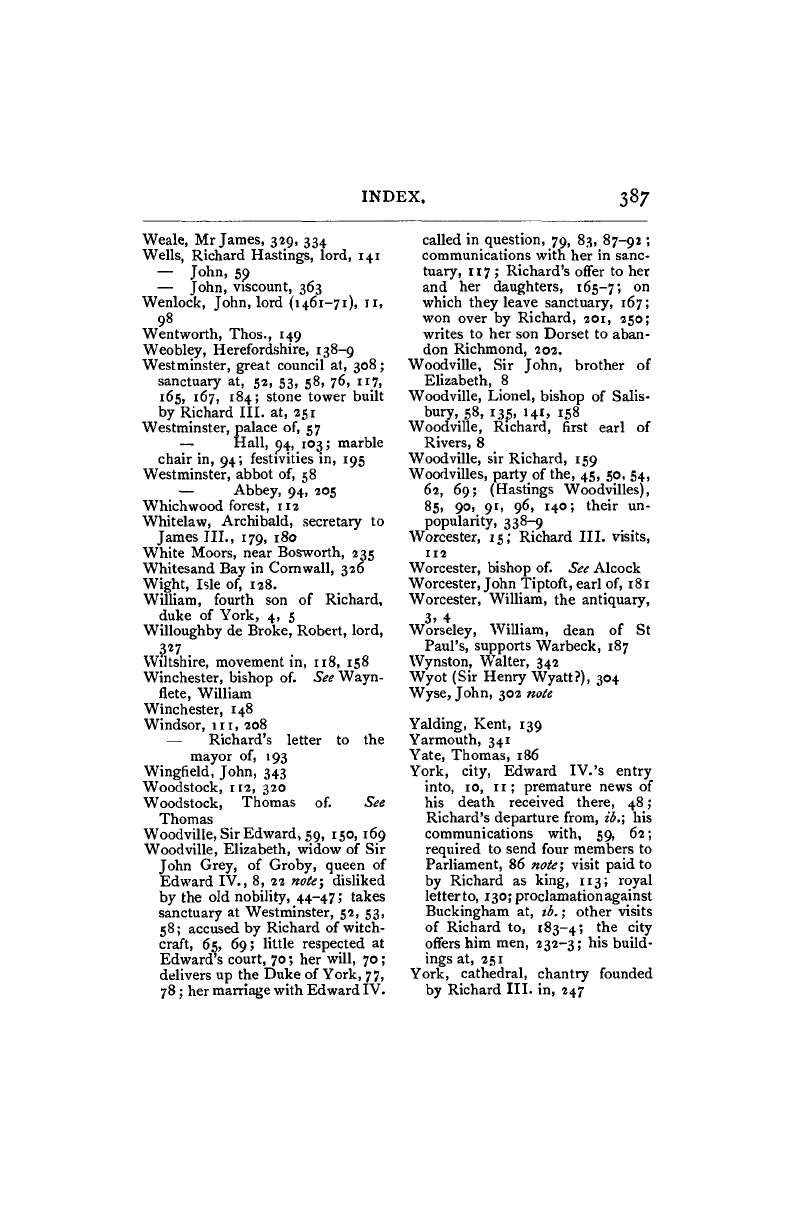
INDEX.
387
Weale, Mr James, 329, 334
Wells,
Richard Hastings, lord, 141
— John, 59
— John, viscount, 363
Wenlock, John, lord (1461-71), 11,
98
Wentworth, Thos., 149
Weobley, Herefordshire, 138-9
Westminster, great council at, 308 ;
sanctuary at, 52, 53, 58, 76, 117.
165,
167, 184; stone tower built
by Richard III. at, 251
Westminster, palace of, 57
— Hall, 94, 103; marble
chair in, 94; festivities in, 195
Westminster, abbot of, 58
— Abbey, 94, 205
Whichwood forest, 112
Whitelaw, Archibald, secretary to
James III., 179, 180
White Moors, near Bosworth, 235
Whitesand Bay in Cornwall, 326
Wight, Isle of, 128.
William, fourth son of Richard,
duke of York, 4, 5
Willoughby de Broke, Robert, lord,
Wiltshire, movement in, 118, 158
Winchester, bishop of. See Wayn-
flete, William
Winchester, 148
Windsor, m, 208
— Richard's letter to the
mayor of, 193
Wingfield, John, 343
Woodstock, 112, 320
Woodstock, Thomas of. See
Thomas
Woodville, Sir Edward, 59, 150,169
Woodville, Elizabeth, widow of Sir
John Grey, of Groby, queen of
Edward IV., 8, 22 note; disliked
by the old nobility, 44-47; takes
sanctuary at Westminster, 52, 53,
58;
accused by Richard of witch-
craft, 65, 69; little respected at
Edward's court, 70; her will, 70;
delivers up the Duke of York, 77,
78;
her marriage with Edward IV.
called in question, 79, 83, 87-92 ;
communications with her in sanc-
tuary, 117; Richard's offer to her
and her daughters, 165-7;
on
which they leave sanctuary, 167;
won over by Richard, 201, 250;
writes to her son Dorset to aban-
don Richmond, 202.
Woodville, Sir John, brother of
Elizabeth, 8
Woodville, Lionel, bishop of Salis-
bury, 58, 135, 141, 158
Woodville, Richard, first earl of
Rivers, 8
Woodville, sir Richard, 159
Woodvilles, party of the, 45, So, 54,
62,
69; (Hastings Woodvilles),
85,
90, 91, 96, 140; their un-
popularity, 338-9
Worcester, 15; Richard III. visits,
112
Worcester, bishop of. See Alcock
Worcester, John Tiptoft, earl of, 181
Worcester, William, the antiquary,
3,
4
Worseley, William, dean of St
Paul's,
supports Warbeck, 187
Wynston, Walter, 342
Wyot (Sir Henry Wyatt?), 304
Wyse, John, 302 note
Yalding, Kent, 139
Yarmouth, 341
Yate,
Thomas, 186
York, city, Edward IV.'s entry
into,
10, 11; premature news of
his death received there, 48;
Richard's departure from, ib.\ his
communications with, 59, 62;
required to send four members to
Parliament, 86 note; visit paid to
by Richard as king, 113; royal
letterto,
130;
proclamation against
Buckingham at, ib.; other visits
of Richard to, 183-4; the city
offers him men,
232-3;
his build-
ings at, 251
York, cathedral, chantry founded
by Richard III. in, 247
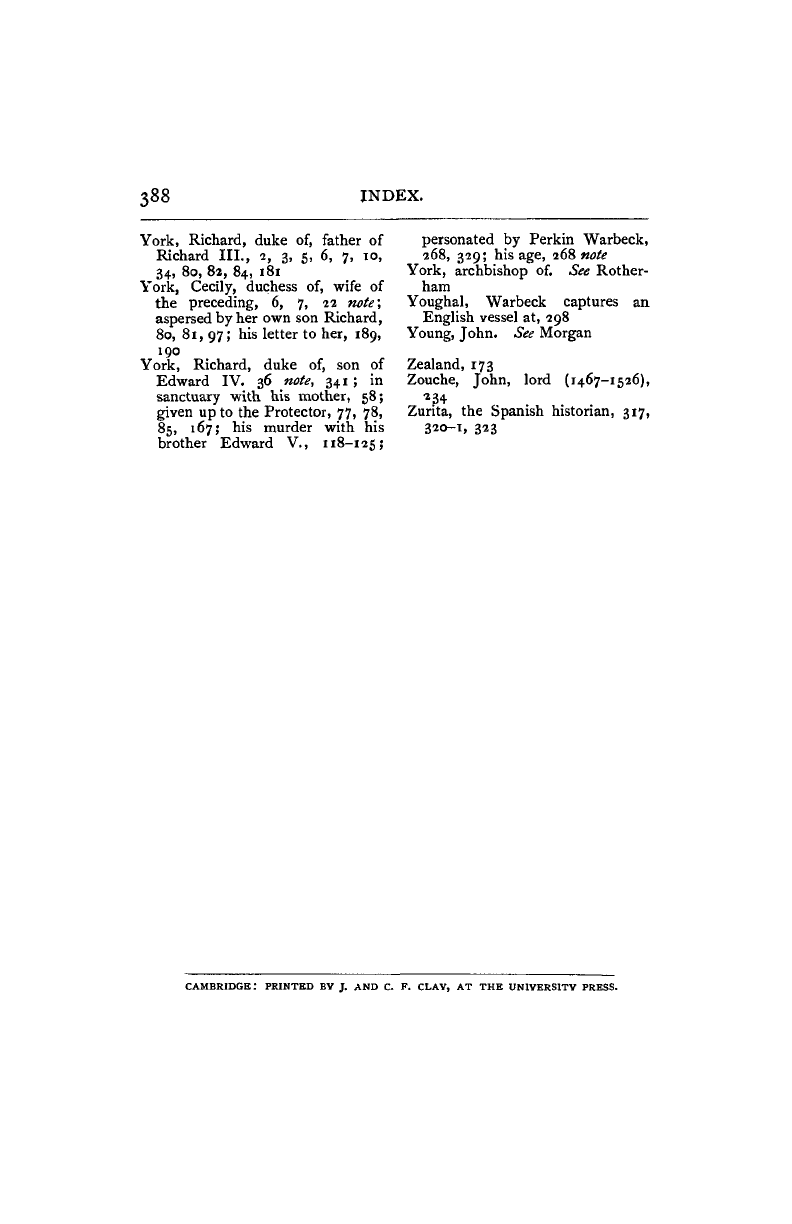
3
88 INDEX.
York, Richard, duke of, father of
Richard III., 2, 3, 5, 6, 7, TO,
34,
80, 82, 84, 181
York, Cecily, duchess of, wife of
the preceding, 6, 7, 22 note;
aspersed by her own son Richard,
80,
81, 97; his letter to her, 189,
190
York, Richard, duke of, son of
Edward IV. 36 note, 341 ; in
sanctuary with his mother, 58;
given up to the Protector, 77, 78,
85,
167; his murder with his
brother Edward V., 118-125;
personated by Perkin Warbeck,
268,
329; his age, 268 note
York, archbishop of. See Rother-
ham
Youghal, Warbeck captures an
English vessel at, 298
Young, John. See Morgan
Zealand, 173
Zouche, John, lord (1467-1526),
•2.34
Zurita, the Spanish historian, 317,
320-1,
323
CAMBRIDGE: PRINTED BY J. AND C. F. CLAY, AT THE UNIVERSITY PRESS.
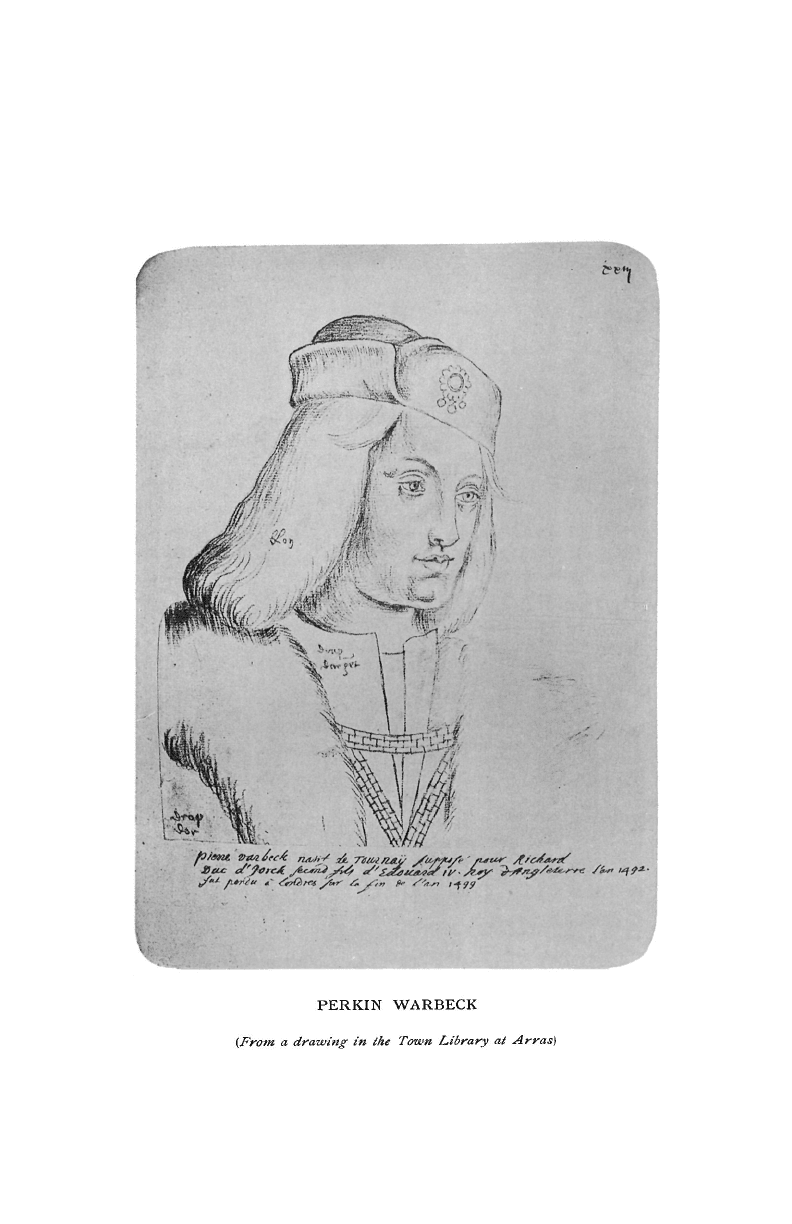
PERKIN WARBECK
{From a drawing in the Town Library at Arras)
